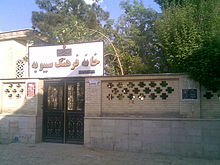
Back سيبويه Arabic Sibəveyh Azerbaijani সিবাওয়েহ Bengali/Bangla Sibawayh Catalan سیبەوەی CKB Sibawayhi German Sibavejhi Esperanto Sibuyé Spanish سیبویه Persian Sîbawayh French
Sibawayh سيبويه | |
|---|---|
 Entrance to Sibawayh's tomb in Shiraz | |
| Born | c. 760, Shiraz, Persia,[1] Abbasid Caliphate |
| Died | c. 796,[2] Shiraz, Persia or Basra, Iraq, Abbasid Caliphate |
| Era | Medieval philosophy |
| Region | Islamic philosophy |
Main interests | Arabic and Persian |
Sibawayh (Arabic: سِيبَوَيْه IPA: [siːbawajh] (also pronounced IPA: [siːbaweː(h)] in many modern dialects) Sībawayh; Persian: سِیبُویه Sībūye [siːbuːˈje]; c. 760–796), whose full name is Abu Bishr Amr ibn Uthman ibn Qanbar al-Basri (أَبُو بِشْر عَمْرو بْن عُثْمَان بْن قَنْبَر ٱلْبَصْرِيّ, ’Abū Bishr ‘Amr ibn ‘Uthmān ibn Qanbar al-Baṣrī), was a Persian[4][5] leading grammarian of Basra and author of the earliest book on Arabic grammar. His famous unnamed work, referred to as Al-Kitāb, or "The Book", is a five-volume seminal discussion of the Arabic language.[6]
Ibn Qutaybah, the earliest extant source, in his biographical entry under Sibawayh simply wrote:
He is Amr ibn Uthman, and he was mainly a grammarian. He arrived in Baghdad, fell out with the local grammarians, was humiliated, went back to some town in Persia, and died there while still a young man.[7]
The tenth-century biographers Ibn al-Nadim and Abu Bakr al-Zubaydi, and in the 13th-century Ibn Khallikan, attribute Sibawayh with contributions to the science of the Arabic language and linguistics that were unsurpassed by those of earlier and later times.[8][9] He has been called the greatest of all Arabic linguists and one of the greatest linguists of all time in any language.[10]
- ^ Zubaydī (al-) 1984, p. 66, §6 (#22).
- ^ Mit-Ejmes
- ^ a b c d e f Sībawayh, ʻAmr ibn ʻUthmān (1988), Hārūn, ʻAbd al-Salām Muḥammad (ed.), Al-Kitāb Kitāb Sībawayh Abī Bishr ʻAmr ibn ʻUthmān ibn Qanbar, vol. Introduction (3rd ed.), Cairo: Maktabat al-Khānjī, pp. 7–12
- ^ Danner, V. (1986). "Arabic Language iv. Arabic literature in Iran". Encyclopaedia Iranica, Vol. II, Fasc. 3. Encyclopaedia Iranica Foundation. pp. 237–243.
Persians have been prominent as well in the fields of Arabic grammar, philology, and lexicography. The greatest name in Arabic grammar belongs to the Persian Sībawayh (Sībūya) Bayżāwī (fl. 180/796), whose work, al-Ketāb (The book), remains to the present day the most authoritative exposition of Arabic grammar.
- ^ Donner, F.M. (1988). "Basra". Encyclopaedia Iranica, Vol. III, Fasc. 8. Encyclopaedia Iranica Foundation. pp. 851–855.
Some of these cultural figures were of Iranian descent, including the early paragon of piety Ḥasan al-Baṣrī; Sebawayh, one of the founders of the study of Arabic grammar; the famed poets Baššār b. Bord and Abū Nowās; the Muʿtazilite theologian ʿAmr b. ʿObayd; the early Arabic prose stylist Ebn al-Moqaffaʿ; and probably some of the authors of the noted encyclopedia of the Eḵwān al-Ṣafāʾ.
- ^ Kees Versteegh, The Arabic Linguistic Tradition, pg. 4. Part of the Landmarks in Linguistic Thought series, vol. 3. London: Routledge, 1997. ISBN 9780415157575
- ^ Michael G. Carter, Sibawayhi, pg. 8.
- ^ Ibn Khallikan (1868). Ibn Khallikan's Biographical. Vol. 2. Translated by MacGuckin de Slane, William. London: W.H. Allen. p. 396.
- ^ Meri, Josef W. (January 2006). Medieval Islamic Civilization, An Encyclopedia. Vol. 1. Routledge. p. 741. ISBN 978-0-415-96691-7.
Of Persian origin, he attached himself in the middle of the second/eighth century to a number of early authorities on the Arabic language in Basra, notably al-Khalil ibn Ahmad and Yunus ibn Habib.
- ^ Jonathan Owens, Early Arabic Grammatical Theory: Heterogeneity and Standardization, pg. 8. Volume 53 of Amsterdam studies in the theory and history of linguistic science. Amsterdam: John Benjamins Publishing Company, 1990. ISBN 9789027245380